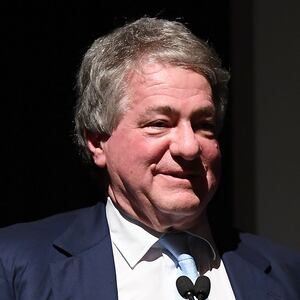As billionaire Leon Black battled a public backlash over his $158 million in payments to sex-trafficker Jeffrey Epstein, one of his Dartmouth College associates was elected this spring to the boards of both his private-equity firm Apollo Global Management and the Museum of Modern Art, where he’s riding out his last term as chairman amid scandal.
Pamela Joyner, a prominent San Francisco-based philanthropist and art collector, was voted into Apollo’s board in January—just before Black announced he would step down as CEO—and MoMA’s board of trustees soon after, The Daily Beast has learned. In late March, Black revealed he was giving up his role as MoMA chairman, though he remains on the museum’s board despite his Epstein problem and new accusations that he sexually assaulted and threatened a woman for years. (Black denies the woman’s claims and is adamant he had no knowledge or involvement in Epstein’s crimes.)
Joyner and Black, both Dartmouth College alums, served together on the school’s board of trustees and have a history of business ties. In 2005, according to one report, Joyner’s firm Avid Partners was the placement agent that helped an Apollo affiliate, Apollo Investment Management, secure a $150-million investment from North Carolina’s state pension fund. She also reportedly steered $40 million of Dartmouth’s endowment into Apollo funds.
That Joyner was elected to two boards affiliated with Black around the same time is raising eyebrows among some MoMA officers. “As an outsider, I would say it doesn’t pass the smell test,” one trustee told us.
MoMA, Black, and Joyner did not return messages seeking comment.
The New York Post first reported on Joyner’s new role at Apollo and her long-standing connections to Black. According to the report, Joyner and another associate of Black’s, Siddhartha Mukherjee, “were only seriously brought before the board the weekend of Jan. 22”—three days before Black publicly announced his exit from the firm. Apollo brass approved Mukherjee and Joyner “over a tumultuous three-day period without any interviews,” let alone disclosure of their relationship to Black, the Post reported.
Still, the MoMA trustee told The Daily Beast that the museum was courting Joyner for years and that she’s highly sought after in the art world. The person said Joyner—named to Former President Barack Obama’s Committee on the Arts and the Humanities, as well as Vanity Fair’s Best-Dressed List—was voted in at MoMA about three months ago. “She’ll be good because she’s no wallflower,” the source added. “She’s a voice.”
Joyner and her husband, private equity investor Alfred Giuffrida, are known for advocating for Black artists often ignored by art history. “Our society allowed institutions for a long time to overlook deserving creatives for the arbitrary reason that they were Black, brown or female,” Joyner recently told the San Francisco Chronicle. She is also on the board of the San Francisco Museum of Modern Art, the Art Institute of Chicago, and the J. Paul Getty Trust, and repeatedly makes the ARTnews Top 200 collectors list with Giuffrida.
Not all the press surrounding Joyner, however, has been laudatory.
In 2009, one North Carolina news outlet reported on a potential conflict of interest between Joyner and her husband and a state treasury official. The state’s pension fund had invested $225 million in Horsley Bridge Partners, which received almost $1.5 million in management fees and where Giuffrida is managing director. A few years prior, former Deputy State Treasurer Patricia Gerrick, who oversaw the public retirement fund, named Joyner an executor of her will, the Carolina Journal reported.
According to the Journal, Gerrick’s 2006 mortgage document noted a 2005 trust “for the benefit” of Joyner and three others. Gerrick denied there was anything untoward about the arrangement and said Joyner was only an unpaid executor. “She’s not getting any money from me, and I’m not getting any money from her,” Gerrick said at the time. Joyner and her husband didn’t comment.
WRAL reported Joyner and Giuffrida were longtime friends of Gerrick, and that Joyner had donated $4,000 to the campaign of Gerrick’s boss, State Treasurer Janet Cowell.
Meanwhile, in 2012, when a group of anonymous Dartmouth employees asked New Hampshire’s Attorney General to investigate the college’s endowment investments, they listed Joyner and Black among 10 alumni and trustees whose firms were reportedly benefiting from the funds. (The AG declined to take any action.)
The Friends of Eleazar Wheelock, named after Dartmouth’s founder, sent a letter to the AG’s office asking officials to probe potential conflicts of interest with these investments. “We are a group of former and current faculty, staff, and employees of Dartmouth College,” their missive began. “For over a decade we have been witnessing the quiet takeover of this great College by a cabal of external, wealthy alumni/ae of the college.”
The critics suggested the Dartmouth trustees “simultaneously directed the College’s three billion dollar endowment to themselves, their firms, and their friends” and “enriched themselves through managing and directing Dartmouth’s three billion dollar endowment.” The letter added, “In all cases they have taken gargantuan fund management fees through ‘Private Equity,’ ‘Venture Capital,’ and ‘Hedge Funds’ investments which they, themselves, manage and are the owners of.”
In a section highlighting Joyner, the letter called her “a go-between” and “a finder” for Black and a second Dartmouth trustee and investor. “According to employees of The College, Joyner used her influence to secure the coveted role of Chairman of the Dartmouth Investment Committee, with the power to direct Dartmouth’s three billion dollar endowment,” the letter stated. “It is small wonder that of the sixty-five million dollars invested in Leon Black’s Apollo funds, forty million was invested during Joyner’s tenure…”
Of Black, the critics fumed that the mogul donated $48 million to Dartmouth’s Visual Arts Center, named after him and his wife Debra, while raking in massive fees from the college’s stake in Apollo investment funds. The letter accused the college of paying “sky-high fees to a group of investment manager trustees” who then “recycled some portion of the fees” as donations “often with the perk of having an edifice named (or renamed) after them.”
When The New York Times covered the controversy, Black and Joyner declined to comment.
Joyner’s addition to MoMA comes as Black’s reputation continues to nosedive following revelations that he hobnobbed and paid millions in fees to Jeffrey Epstein as recently as 2017—long after Epstein was convicted of soliciting a minor in Palm Beach and when the perverted financier’s molestation of underage girls and young women was widely known.
On June 1, a former model named Guzel Ganieva filed a defamation suit against Black, claiming he lied when he publicly accused her of extortion—and that he threatened her to stay silent about his “sexual violence” toward her. Two months earlier, the press had covered Ganieva’s accusations of abuse against Black, who responded in a statement: “I foolishly had a consensual affair with Ms. Ganieva that ended more than seven years ago. Any allegation of harassment or any other inappropriate behavior towards her is completely fabricated. The truth is that I have been extorted by Ms. Ganieva for many years and I made substantial monetary payments to her, based on her threats to go public concerning our relationship, in an attempt to spare my family from public embarrassment.”
Ganieva says Black targeted her at an International Women's Day event in New York in March 2008 and promised to help her career. At the time, she was a single mom in her twenties who’d moved to the U.S. from Russia. Once they were alone together, the lawsuit says, “Black forced sadistic sexual acts on her without her consent and despite her saying no.” The sexual assaults continued for years, she says, and Black convinced her to take two $480,000 loans from him and coerced her into signing a non-disclosure agreement. “It was not an offer because refusing Black was not an option,” the complaint alleges. “He reminded Ms. Ganieva that if she did not take the ‘deal,’ i.e., his hush money, he would make sure she ended up ‘in prison’ or he would ‘destroy her life.’”
A spokesman for Black denied Ganieva’s claims and said her “frivolous lawsuit is riddled with lies and is nothing more than a wholesale fiction.”
But the latest Black drama isn’t sitting well with MoMA officials who are growing tired of the stream of bad press surrounding him and, by extension, the museum.
None of MoMA’s trustees would speak publicly about Black, though one told us, “If people truly care about an institution knowing full well you’re a distraction, sometimes it’s just time to gracefully say goodbye.”
“Hopefully he’ll be riding off into the sunset sooner than we think.”








